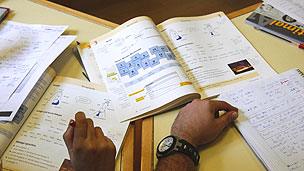More pupils taking international GCSEs
- Published
- comments

Pupils starting GCSE courses this autumn will mainly do exams at the end of two years
More pupils in the UK are taking international GCSEs, figures from exam boards suggest.
In England, the increase has followed a lifting of a ban which stopped state schools from entering pupils for them.
The exams - known as IGCSEs - are taken at the end of two years - unlike many GCSEs, where students take exams in stages over two years.
Overall, UK schools made 50,000 IGCSE entries this year, this compares to the more than 5m GCSE entries last year.
From September, pupils in England starting GCSE courses will mostly take exams after two years.
In 2010, the coalition said state schools should be allowed to enter pupils for IGCSEs.
Until then, the qualifications could not be counted in school league tables.
Two exam boards which produce the qualifications are reporting increases in take-up.
Cambridge International Examinations says 400 state schools in the UK are now preparing pupils for IGCSEs, compared with 97 in 2010.
Among private schools, 500 are using IGCSEs, compared with 320 in 2010.
The Edexcel exam body also has IGCSEs and says the number of schools and colleges entering pupils for them in the UK more than doubled in the past two years, rising to just under 2,000.
'O-level style' exams
A spokesman for Pearson, Edexcel's parent company, said: "The continuing popularity of IGCSEs in this country and abroad supports our view that students should be able to choose the qualifications that suit their interests, ambitions and style of learning."
Peter Monteath, from Cambridge International Examinations, said: "The feedback we are getting from schools is that they like the flexibility of these syllabuses, which gives teachers more scope to explore different topics with students.
"Their linear structure also gives students space and time to study topics in-depth."
Some have voiced concern about the move away from modular exams, where students can revise particular topics for an exam rather than the whole syllabus.
The change applies to exams taken by pupils in England.
Education ministers in Northern Ireland and Wales are considering whether to follow England or keep existing styles of exam.
They recently wrote to Education Secretary Michael Gove to complain they were not consulted over leaked plans to make further changes to GCSEs for England - billed as a return to O-level-style exams.
The Welsh government is conducting a review of qualifications for teenagers and says it will make a decision after that is complete.
- Published1 August 2012
- Published21 June 2012
- Published21 June 2012
- Published27 June 2011
- Published21 June 2012
- Published6 October 2011
- Published12 May 2011